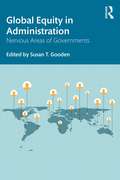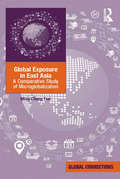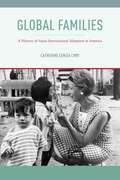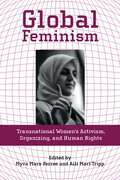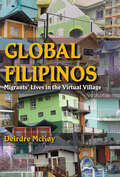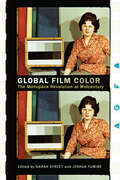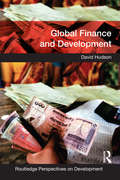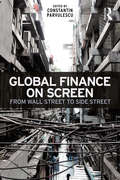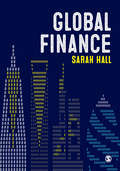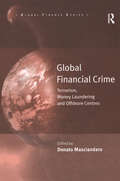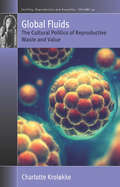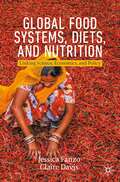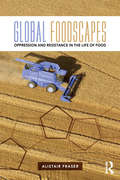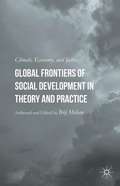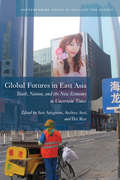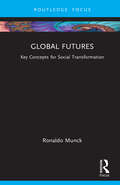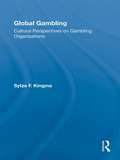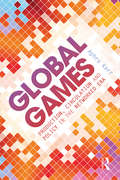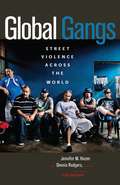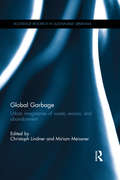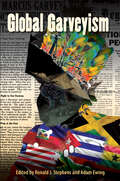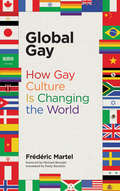- Table View
- List View
Global Equity in Administration: Nervous Areas of Governments
by Susan T. GoodenGovernments around the world face the challenge of espousing principles of fairness but practicing inequity in their administration. Issues of equity and justice are fundamental concerns of government, and thus to public administrators, who constantly struggle to evaluate a country’s social climate and ensure equity in governance. Such evaluation is unlikely to occur in a serious way, however, if government actors are fundamentally too uncomfortable to directly engage the topic. The result, this book argues, is a context of 'nervousness,' which unless squarely acknowledged and addressed, can become debilitating and thwart progress toward achieving social equity. This volume explores and expands our understanding of the concept of nervousness in the administration of government services around the world, demonstrating the ways in which such an emotional and physical reaction can debilitate government actions that are needed to promote social equity and justice. Each of the chapters in this edited volume focuses on a single country and examines a specific nervous area of government, highlighting important historical and political considerations, as well as specific evidence of promising progress. It considers the complexity of nervous areas of governments around the world, while identifying encouraging approaches and initiatives. Global Equity in Administration is required reading for all practicing and aspiring public servants concerned with fair and equitable provision of public services around the world.
Global Ethics and Environment
by Nicholas LowAs global capitalism expands and reaches ever-further corners of the world, practical problems continue to escalate and repercussions become increasingly serious and irreversible. These practical problems carry with them equally important and ethical issues.Global Ethics and Environment explores these ethical issues from a range of perspectives and using a wide range of case studies. Chapters focus on: the impact of development in new industrial regions; the ethical relationship between human and non-human nature; the application of ethics in different cultural and institutional contexts; environmental injustice in the location of hazardous materials and processes; the ethics of the impact of a single event (Chernobyl) on the global community; the ethics of transitional institutions.This collection will both stimulate debate and provide an excellent resource for wide-ranging case study material and solid academic context.
Global Exposure in East Asia: A Comparative Study of Microglobalization (Global Connections)
by Ming-Chang TsaiIn contrast to speculative, sweeping literature on globalization Global Exposure in East Asia grounds globalization theories in a detailed empirical analysis, providing a systematic investigation of what until now have been grand narratives of huge global phenomena. This book presents a micro-level explanation of globalization by examining individual global exposure and its influence in the values and perceptions of individuals, contending that individual and personal global experience, or 'microglobalization', is a key variable in understanding how modern mobile persons act and think in ways different from those who remain geographically immobile and constrained. Drawing on detailed empirical evidence from China, Japan, Taiwan and South Korea, Global Exposure in East Asia explores the structures of global exposure and their influences on values and identities in contemporary East Asia. A rich, comparative and grounded examination of modern theories of globalization, this book introduces an innovative perspective that highlights the significance of microglobalization in understanding quotidian lives in a context of ever expanding transnational exchanges and connectivities. As such, it will appeal to social scientists with interests in globalization, cosmopolitanism, mobility, migration and transnationalism, (national) identity and everyday life.
Global Families: A History of Asian International Adoption in America (Nation of Nations #8)
by Catherine Ceniza ChoyIn the last fifty years, transnational adoption—specifically, the adoption of Asian children—has exploded in popularity as an alternative path to family making. Despite the cultural acceptance of this practice, surprisingly little attention has been paid to the factors that allowed Asian international adoption to flourish. In Global Families, Catherine Ceniza Choy unearths the little-known historical origins of Asian international adoption in the United States. Beginning with the post-World War II presence of the U.S. military in Asia, she reveals how mixed-race children born of Japanese, Korean, and Vietnamese women and U.S. servicemen comprised one of the earliest groups of adoptive children. Based on extensive archival research, Global Families moves beyond one-dimensional portrayals of Asian international adoption as either a progressive form of U.S. multiculturalism or as an exploitative form of cultural and economic imperialism. Rather, Choy acknowledges the complexity of the phenomenon, illuminating both its radical possibilities of a world united across national, cultural, and racial divides through family formation and its strong potential for reinforcing the very racial and cultural hierarchies it sought to challenge.
Global Feminism: Transnational Women's Activism, Organizing, and Human Rights
by Myra Marx Ferree Aili Mari TrippExplores the social and political developments that have energized movements of global feminismIncreasingly feminists around the world have successfully campaigned for recognition of women's full personhood and empowerment. Global Feminism explores the social and political developments that have energized this movement. Drawn from an international group of scholars and activists, the authors of these original essays assess both the opportunities that transnationalism has created and the tensions it has inadvertently fostered. By focusing on both the local and global struggles of today's feminist activists this important volume reveals much about women's changing rights, treatment and impact in the global world.Contributors: Melinda Adams, Aida Bagic, Yakin Ertürk, Myra Marx Ferree, Amy G. Mazur, Dorothy E. McBride, Hilkka Pietilä, Tetyana Pudrovska, Margaret Snyder, Sarah Swider, Aili Mari Tripp, Nira Yuval-Davis.
Global Filipinos: Migrants' Lives in the Virtual Village
by Deirdre McKayThe author of An Archipelago of Care documents the experiences of Filipino contract workers from the same village, traveling abroad for jobs.Contract workers from the Philippines make up one of the world’s largest movements of temporary labor migrants. Deirdre McKay follows Filipino migrants from one rural community to work sites overseas and then home again. Focusing on the experiences of individuals, McKay interrogates current approaches to globalization, multi-sited research, subjectivity, and the village itself. She shows that rather than weakening village ties, temporary labor migration gives the village a new global dimension created in and through the relationships, imaginations, and faith of its members in its potential as a site for a better future.“A unique and important study that adds a refreshing and necessary reminder that, on the most fundamental level, a village is part of the global world.” —Nicole Constable, author of Maid to Order in Hong Kong: Stories of Migrant Workers“A luminous, elegant, and well-argued multi-sited ethnographic study.” —Martin F. Manalansan IV, author of Global Divas: Filipino Gay Men in the Diaspora“The problems of overseas Filipino workers with loneliness; long absences from spouses, children, and other relatives; abuse by employers and governments; and efforts to use their time and talent to further individual opportunities are understood easily in McKay’s monograph. The photos of her Filipino informants . . . add a human touch to the topic of overseas workers. . . . Recommended.” —Choice
Global Film Color: The Monopack Revolution at Midcentury
by William Carroll Joshua Yumibe Philip Cavendish Kathryn Millard Sarah Street Laura Major Ranjani Mazumdar Stefan Soloman Kirsty Sinclair Dootson Kamalika Sanyal Heather Heckman Lydia Pappas Elena Gipponi Rafael de Luna Freire Josephine Diecke Linda Chen ZhangGlobal Film Color: The Monopack Revolution at Midcentury explores color filmmaking in a variety of countries and regions including India, China, Japan, and Russia, and across Europe and Africa. Most previous accounts of color film have concentrated on early 20th century color processes and Technicolor. Far less is known about the introduction and application of color technologies in the period from the mid-1940s to the 1980s, when photochemical, “monopack” color stocks came to dominate global film markets. As Eastmancolor, Agfacolor, Fujicolor and other film stocks became broadly available and affordable, national film industries increasingly converted to color, transforming the look and feel of global cinema. Covering a broad range of perspectives, the chapters explore themes such as transnational flows, knowledge exchange and transfer, the cyclical and asymmetrical circulation of technology in a global context, as well as the accompanying transformation of color film aesthetics in the postwar decades.
Global Finance and Development (Routledge Perspectives on Development)
by David HudsonThe question of money, how to provide it, and how to acquire it where needed is axiomatic to development. The realities of global poverty and the inequalities between the ‘haves’ and the ‘have-nots’ are clear and well documented, and the gaps between world’s richest and the world’s poorest are ever-increasing. But, even though funding development is assumed to be key, the relationship between finance and development is contested and complex. This book explores the variety of relationships between finance and development, offering a broad and critical understanding of these connections and perspectives. It breaks finance down into its various aspects, with separate chapters on aid, debt, equity, microfinance and remittances. Throughout the text, finance is presented as a double-edged sword: while it is a vital tool towards poverty reduction, helping to fund development, more critical approaches remind us of the ways in which finance can hinder development. It contains a range of case studies throughout to illustrate finance in practice, including, UK aid to India, debt in Zambia, Apple’s investment in China, microfinance in Mexico, government bond issues in Chile, and financial crisis in East Asia. The text develops and explores a number of themes throughout, such as the relationship between public and private sources of finance and debates about direct funding versus the allocation of credit through commercial financial markets. The book also explores finance and development interactions at various levels, from the global structure of finance through to local and everyday practices. Global Finance and Development offers a critical understanding of the nature of finance and development. This book encourages the reader to see financial processes as embedded within the broader structure of social relationships. Finance is defined and demonstrated to be money and credit, but also, crucially, the social relationships and institutions that enable the creation and distribution of credit and the consequences thereof. This valuable text is essential reading for all those concerned with poverty, inequality and development.
Global Finance on Screen: From Wall Street to Side Street
by Constantin ParvulescuGlobal Finance on Screen is the first collection exclusively dedicated to a growing body of multi-format and multimedia audiovisual work that this book designates as the finance film. Finance film provides critical visualizations of the secretive, elitist, PR firewalled, and gender and race-biased world of finance, and its mysterious characters, jargon and products. It reconstructs for the screen and for broader audiences finance’s logics, responsibilities, practices, and ethos, and traces the effects of money, markets, investment, credit, debt, bubbles, and crashes on our well-being, desires, values, and actions. The chapters for this interdisciplinary collection are written by European and North American scholars in film studies, anthropology, business ethics, cultural studies, political economy, and sociology. They reveal and evaluate the ability of film to document financial cultures; reflect economic, cultural and political transformations related to financialization; indicate the alienating and exploitative consequences of the growing role played by financial services in the global economy; mobilize social action against finance’s excesses; as well as spread finance and capitalist mythology. The collection offers in-depth investigations of feature films such as Wall Street, Freefall, Margin Call, Justice&Co, The Wolf of Wall Street, and The Big Short, and documentaries such as Inside Job, Capitalism: A Love Story and In a Strange Land.
Global Finance: Places, Spaces and People
by Sarah HallThe financial crisis of 2007–8 and its aftermath have resulted in the role of money and finance within the global economy becoming the subject of considerable debate in public, policy and media circles. Global Finance is a timely look at the contemporary international financial environment, providing an introduction to this dynamic field of research for students and more advanced researchers. Drawing on economic geography, economic sociology and critical management, Hall offers a broad selection of case studies that ground critical theory in our current financial climate. Hall examines and reviews a wide range of critical approaches relating to the role of money and finance in the global economy, dividing these approaches into three key sections: Global finance and international financial centres. Global finance and the ‘real’ economy’. Global financial subjects and actors. The book takes a uniquely interdisciplinary approach which, combined with an international spread of case studies, makes this book highly valuable to a wide range of upper level undergraduate courses across the social sciences.
Global Finance: Places, Spaces and People
by Sarah HallThe financial crisis of 2007–8 and its aftermath have resulted in the role of money and finance within the global economy becoming the subject of considerable debate in public, policy and media circles. Global Finance is a timely look at the contemporary international financial environment, providing an introduction to this dynamic field of research for students and more advanced researchers. Drawing on economic geography, economic sociology and critical management, Hall offers a broad selection of case studies that ground critical theory in our current financial climate. Hall examines and reviews a wide range of critical approaches relating to the role of money and finance in the global economy, dividing these approaches into three key sections: Global finance and international financial centres. Global finance and the ‘real’ economy’. Global financial subjects and actors. The book takes a uniquely interdisciplinary approach which, combined with an international spread of case studies, makes this book highly valuable to a wide range of upper level undergraduate courses across the social sciences.
Global Financial Crime: Terrorism, Money Laundering and Offshore Centres (Global Finance)
by Donato MasciandaroThe scope for financial crime has widened with the expansion and increased integration of financial markets. Money laundering, terrorism financing and tax crime have all changed in both nature and dimension. As new technologies reduce the importance of physical proximity to major onshore financial centres so a new generation of Offshore Financial Centres (OFCs) have emerged. This accessible volume provides a deeper analysis of the economic, institutional and political features of the OFCs, in order to design the optimal international regulatory policy. Using a multidisciplinary approach with an international level of expertise, the book evaluates international policies regarding offshore countries on the basis of a systematic analysis of their characteristics.
Global Fluids: The Cultural Politics of Reproductive Waste and Value (Fertility, Reproduction and Sexuality: Social and Cultural Perspectives #39)
by Charlotte KroløkkeIn the fertility and cosmetics industries, women’s body products – such as urine, eggs, and placentas – have moved from being seen as waste to becoming valuable ingredients. Taking a sociological and anthropological perspective, the author focuses in particular on the role that countries like Denmark, Spain, the Netherlands, and Japan play in the reproductive products industry, and discusses the moral limits of the cultural and rhetorical trajectories that turn women’s body products into internationally mobile substances.
Global Food Systems, Diets, and Nutrition: Linking Science, Economics, and Policy (Palgrave Studies in Agricultural Economics and Food Policy)
by Claire Davis Jessica FanzoEnsuring optimal diets and nutrition for the global population is a grand challenge fraught with many contentious issues. To achieve food security for all and protect health, we need functional, equitable, and sustainable food systems. Food systems are highly complex networks of individuals and institutions that depend on governance and policy leadership. This book explains how interconnected food systems and policies affect diets and nutrition in high-, middle-, and low-income countries. In tandem with food policy, food systems determine the availability, affordability, and nutritional quality of the food supply, which influences the diets that people are willing and able to consume. Readers will become familiar with both domestic and international food policy processes and actors, and they will be able to critically analyze and debate how policy and science affect diet and nutrition outcomes.
Global Foodscapes: Oppression and resistance in the life of food
by Alistair FraserWhat we eat – as well as how it is produced, processed, moved, sold, and used by our bodies seems to matter like never before. Global Foodscapes takes on this topicality and asks readers to think about how we are all involved in the making of an odd and, in many ways, troubling and contested food economy. It explores how food is conceived, traded, grown, reared, processed, sold, and consumed; investigates what goes wrong along the way; and assesses what diverse people around the world are doing to fix these faults. The text uses a carefully-crafted framework that explores the interaction of five forms of oppression and five means of resistance as they are worked out over five stages in the food economy. It draws on case studies from around the world that illuminate key issues about food in today's world; examines how oppression affects diverse people caught up in the food economy; and highlights how individuals, groups, and institutions such as governments, but also firms, are trying to improve how we interact with the food system. Global Foodscapes is a highly accessible and useful text for undergraduate students interested in the global food economy. The global range of case studies, examples, and reference points, as well as its original framework allows the text to speak to diverse audiences and generate debate about whether anything – and if so, what – needs to be done about the food system we depend upon so heavily. Additional materials such as suggested readings and discussion points help students consider the issues at hand and conduct initial and more detailed research on today's food economy.
Global Forest Governance and Climate Change: Interrogating Representation, Participation, And Decentralization (Palgrave Studies In Natural Resource Management Ser.)
by Emmanuel O. NuesiriThis edited collection assesses governance in forestry programmes and projects, including REDD+ governance. It examines political representation, participation and decentralisation in forest governance, providing insight as to how forest governance arrangements can be responsive to the socio-economic interests of local people and communities who live adjacent to and depend on forests.Global Forest Governance and Climate Change argues that inclusive complementary representation of local communities is required for strong participatory processes and democratic decentralisation of forest governance. Responsiveness to local people’s socio-economic interests in forestry initiatives require paying attention to not just the hosting of participatory meetings and activities, but also to the full cast of appointed, self-authorized, and elected representative agents that stand, speak, and act for local people. This book will be of interest to students and academics across the fields of climate change governance, forestry, development studies, and political economy. It will also be a useful resource for policy makers and practitioners responsible for forestry and climate change initiatives.
Global Frontiers of Social Development in Theory and Practice: Climate, Economy, And Justice
by Brij MohanThis volume examines developmentality and the archeology of its social practices, unfolding systemic failures that muffle progress. Economic, climate, and social justice are the areas of focus for this analysis of human-social development in the fog of ideological-institutional meltdowns.
Global Futures in East Asia: Youth, Nation, and the New Economy in Uncertain Times
by Ann Anagnost Andrea Arai Hai RenThe East Asian economic miracle of the twentieth century is now a fond memory. What does it mean to be living in post-miracle times? For the youth of China, Taiwan, Japan, and South Korea, the opportunities and challenges of the neoliberal age, deeply shaped by global forces in labor markets, powerfully frame their life prospects in ways that are barely recognizable to their parents. Global Futures in East Asiagathers together ethnographic explorations of what its contributors call projects of "life-making. " Here we see youth striving to understand themselves, their place in society, and their career opportunities in the nation, region, and world. While some express optimism, it is clear that many others dread their prospects in the competitive global system in which the failure to thrive is isolating, humiliating, and possibly even fatal. Deeply engaged with some of the most significant theoretical debates in the social sciences in recent years, and rich with rare cross-national comparisons, this collection will be of great interest to all scholars and students interested in the formation of subjects and subjectivities under globalization and neoliberalism.
Global Futures: Key Concepts for Social Transformation (Routledge Critical Development Studies)
by Ronaldo MunckGlobal Futures: Key Concepts for Social Transformation provokes us to rethink some of the key words and concepts which define the current global order. Prompted by crises around the world, it seeks to re-energise our desire for a better future.The book takes seven key concepts from the new global studies and considers how they are used and whether they are adequate for addressing the twenty-first century's increasingly complex global order. The topics covered include widely used concepts such as development, modernity, history, and politics, as well as more unusual themes such as desire, complexity, and alternative futures. The core message of this book is that we need to grasp the complex and contradictory reality behind these important concepts in order to foster a new way of thinking, seeing, and acting for a future fit for human purpose.Written by Ronaldo Munck, a key social theorist and social activist with a Latin American and European background, this book will be perfect for students and researchers of sociology, politics, international relations, and global development.
Global Gambling: Cultural Perspectives on Gambling Organizations (Routledge Advances in Criminology)
by Sytze F. KingmaWhile most research has examined the legal, economic and psychological sides of gambling, this innovative collection offers a wide range of cultural perspectives on gambling organizations. Using both historical and present-day case studies from throughout the world, the authors seriously consider the rituals, symbols, the meanings, values, legitimations, relations (formal as well as informal), and the spaces and artifacts involved in the (re)production of gambling organizations. Contributors not only examine the global influence of commercial gambling, but also demonstrate how the local qualities of gambling organizations remain unique. This volume will be of interest to criminologists, sociologists, anthropologists, and all scholars of gambling.
Global Games: Production, Circulation and Policy in the Networked Era
by Aphra KerrIn the last decade our mobile phones have been infiltrated by angry birds, our computers by leagues of legends and our social networks by pleas for help down on the farm. As digital games have become networked, mobile and casual they have become a pervasive cultural form. Based on original empirical work, including interviews with workers, virtual ethnographies in online games and analysis of industry related documents, Global Games provides a political, economic and sociological analysis of the growth and restructuring of the digital games industry over the past decade. Situating the games industry as both cultural and creative and examining the relative growth of console, PC, online and mobile, Aphra Kerr analyses the core production logics in the industry, and the expansion of circulation processes as game services have developed. In an industry dominated by North American and Japanese companies, Kerr explores the recent success of companies from China and Europe, and the emergent spatial politics as countries, cities, companies and communities compete to reshape digital games in the networked age.
Global Gangs: Street Violence across the World
by Dennis Rodgers Jennifer M. HazenGangs, often associated with brutality and senseless destructive violence, have not always been viewed as inherently antagonistic. The first studies of gangs depicted them as alternative sources of order in urban slums where the state&’s authority was lacking, and they have subsequently been shown to be important elements in some youth life cycles. Despite their proliferation there is little consensus regarding what constitutes a gang. Used to denote phenomena ranging from organized crime syndicates to groups of youths who gather spontaneously on street corners, even the term &“gang&” is ambiguous. Global Gangs offers a greater understanding of gangs through essays that investigate gangs spanning across nations, from Brazil to Indonesia, China to Kenya, and from El Salvador to Russia. Volume editors Jennifer M. Hazen and Dennis Rodgers bring together contributors who examine gangs from a comparative perspective, discussing such topics as the role the apartheid regime in South Africa played in the emergence of gangs, the politics behind child vigilante squads in India, the relationship between immigration and gangs in France and the United States, and the complex stigmatization of youths in Mexico caused by the arbitrary deployment of the word &“gang.&” Featuring an afterword by renowned U.S. gang researcher Sudhir Venkatesh, this volume provides a comprehensive look into the experience of gangs across the world and in doing so challenges conventional notions of identity. Contributors: Enrique Desmond Arias, George Mason U; José Miguel Cruz, Florida International U; Steffen Jensen, DIGNITY–Danish Institute Against Torture; Gareth A. Jones, London School of Economics and Political Science; Marwan Mohammed, École Normale Supérieure, Paris; Jacob Rasmussen, Roskilde U; Loren Ryter, U of Michigan; Rustem R. Safin, National Research Technological U, Russia; Alexander L. Salagaev, National Research Technological U, Russia; Atreyee Sen, U of Manchester; Mats Utas, Nordic Africa Institute; Sudhir Venkatesh, Columbia U; James Diego Vigil, U of California, Irvine; Lening Zhang, Saint Francis U.
Global Garbage: Urban imaginaries of waste, excess, and abandonment (Routledge Research in Sustainable Urbanism)
by Christoph Lindner Miriam MeissnerGlobal Garbage examines the ways in which garbage, in its diverse forms, is being produced, managed, experienced, imagined, circulated, concealed, and aestheticized in contemporary urban environments and across different creative and cultural practices. The book explores the increasingly complex relationship between globalization and garbage in locations such as Beirut, Detroit, Hong Kong, London, Los Angeles, Manchester, Naples, Paris, Rio de Janeiro and Tehran. In particular, the book examines how, and under what conditions, contemporary imaginaries of excess, waste, and abandonment perpetuate – but also sometimes counter – the imbalances of power that are frequently associated with the global metropolitan condition. This interdisciplinary collection will appeal to the fields of anthropology, architecture, film and media studies, geography, urban studies, sociology, and cultural analysis.
Global Garveyism
by Adam Ewing Ronald J. StephensIlluminating the global impact of Marcus Garvey's Black nationalist philosophy Arguing that the accomplishments of Jamaican activist Marcus Garvey and his followers have been marginalized in narratives of the Black freedom struggle, this volume builds on decades of overlooked research to reveal the profound impact of Garvey’s post–World War I Black nationalist philosophy around the globe and across the twentieth century. These essays point to the breadth of Garveyism’s spread and its reception in communities across the African diaspora, examining the influence of Garvey’s Universal Negro Improvement Association (UNIA) in Africa, Australia, North America, and the Caribbean. They highlight the underrecognized work of many Garveyite women and show how the UNIA played a key role in shaping labor unions, political organizations, churches, and schools. In addition, contributors describe the importance of grassroots efforts for expanding the global movement—the UNIA trained leaders to organize local centers of power, whose political activism outside the movement helped Garvey’s message escape its organizational bounds during the 1920s. They trace the imprint of the movement on long-term developments such as decolonization in Africa and the Caribbean, the pan-Aboriginal fight for land rights in Australia, the civil rights and Black Power movements in the United States, and the radical pan-African movement. Rejecting the idea that Garveyism was a brief and misguided phenomenon, this volume exposes its scope, significance, and endurance. Together, contributors assert that Garvey initiated the most important mass movement in the history of the African diaspora, and they urge readers to rethink the emergence of modern Black politics with Garveyism at the center. Contributors: Ronald J. Stephens | Adam Ewing | Keisha N. Blain | Nicole Bourbonnais | José Andrés Fernández Montes de Oca | John Maynard | Erik S. McDuffie | Frances Peace Sullivan | Robert Trent Vinson | Michael O. West
Global Gay: How Gay Culture Is Changing the World (The\mit Press Ser.)
by Frederic MartelA panoramic view of gay rights, gay life, and the gay experience around the world.In Global Gay, Frédéric Martel visits more than fifty countries and documents a revolution underway around the world: the globalization of LGBT rights. From Saudi Arabia to South Africa, from Amsterdam to Tel Aviv, from Singapore to the United States, activists, culture warriors, and ordinary people are part of a movement. Martel interviews the proprietor of a “gay-friendly” café in Amman, Jordan; a Cuban-American television journalist in Fort Lauderdale, Florida; a South African jurist who worked with Nelson Mandela to enshrine gay rights in the country's constitution; an American lawyer who worked on the campaign for marriage equality; an Egyptian man who fled his country after escaping a raid on a gay club; and many others. He tells us that in China, homosexuality is neither prohibited nor permitted, and that much Chinese gay life takes place on social media; that in Iran, because of the strict separation of the sexes, it seems almost easier to be gay than heterosexual; and that Raul Castro's daughter, a gay rights icon in Cuba, expressed her lingering anti-American sentiments by calling for Pride celebrations in May rather than June. Ten countries maintain the death penalty for homosexuals. “Homophobia is what Arab governments give to Islamists to keep them calm,” one activist tells Martel.Martel finds that although the “gay American way of life” has created a global template for gay activism and culture, each country offers distinctly local variations. And around the world, the status of gay rights has become a measure of a country's democracy and modernity.This English edition, which has been thoroughly revised and updated, has received the French Voices Award for excellence in publication and translation, supported by a grant from the French-American Book Fund.
